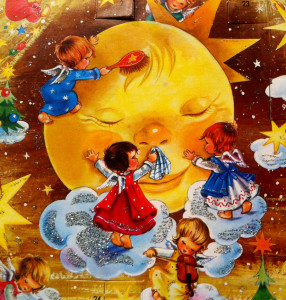THIRD DAY of CHRISTMAS:
Holy Innocents’ Day, Childremas
Pure and simple: Today, this Third Day of Christmas, is all about kids. If you have children or grandchildren or great-grandchildren or nieces or nephews, celebrate them today. But don’t forget as well to celebrate the child you once were. That kid is in there somewhere, and so is that sense of wonder, and it is good sometimes to check at the door all the weight we carry of the world and just be a bit like that old self.
In that same spirit, I’m going to check out slightly tonight and give you for this Third Day of Christmas a reprint of the Convivio Book of Days chapter for the day, one first published on December 28, 2013. I’d write a fresh post, but we are trying to get our winter greetings out in the morning mail, and, well… there is only so much I can do in a day (or a late night). I will mention one thing that I’ve learnt about Childremas since last Christmas: The day was viewed with such great superstition that it was considered unlucky even to put on a new suit on the Third Day of Christmas, or to clip your fingernails, or to flat out begin any project at all. It is the day we remember the innocents slaughtered by order of King Herod after he heard of the Christ child’s birth. Not everything about the Christmas story is good; the story of the Holy Innocents is one that is truly disturbing. Our lesson, perhaps? Never underestimate the threat of an insecure, self-centered man in a position of power.
*
The 28th of December has long been considered the unluckiest day of the year. It is the Third Day of Christmas, Holy Innocents’ Day, and it gets its name from the slaughter of the children of Judea at the order of King Herod after the birth of Jesus, who feared losing his earthly throne to the child. Commencing any undertaking on the 28th of December was to be avoided, especially a marriage or a business venture, for anything begun on this day, it was thought, would certainly fail to prosper.
Be that as it may, the Third Day of Christmas has always been focused on children, and it is a good day to honor not only the children in your life, but also the children we once were: to reconnect with a time when we were more willing to suspend disbelief, more willing to be fully immersed in things, as children are wont to be. The child you were has certainly informed the adult you’ve become, so there is a thread that resonates across the years. This, we feel, is something worth nurturing.
One of the oldest midwinter traditions in the Church is the election of a Boy Bishop each St. Nicholas’s Day on the Sixth of December. He would be chosen from the choirboys, and he would rule until Childremas, this Third Day of Christmas. The office was serious business. The Boy Bishop wore full vestments and mitre, and he would perform all the duties of a bishop, save for celebrating mass, although he did often deliver the sermons. The actual bishop would, in some places, have to follow the orders of the Boy Bishop. These traditions tap into the ideas of the Feast of Fools, as well, where the normal order of things is ceremoniously reversed (which blends into the customs for the Fourth Day of Christmas, tomorrow), and perhaps relates to the words of the Magnificat: God has put down the mighty from their throne and has exalted the humble and the meek.
In medieval times, the Boy Bishop could be found in most every cathedral in France, Britain and Germany during the Yuletide season. The custom was treated with such seriousness that if he should die while in office, the Boy Bishop received the same burial honors as a real bishop. The 1869 Chambers Brothers’ Book of Days gives mention to one unfortunate Boy Bishop who did come to his end while in office, telling us that a monument to his memory may be found on the north side of the nave at Salisbury Cathedral.
In Spain and Latin America, the Third Day of Christmas is a day for practical jokes, the victims of which being called inocentes, although sometimes it is the prankster that gets that name in a plea for forgiveness. No matter how you spend the day, the theme, it seems, is universal: celebrating and honoring children.
Image: A scene from one of the Advent calendars I had as a boy. I saved every one of them. I think traditional German Advent calendars are a sure path back to the language we once spoke as children… and that’s pretty much the reason why we sell them at our website.

Celebrating the children surrounding us, and the child within. And this season, precious time with my two dearest, my niece and nephew, the children of my heart. That circle also extends to include you, John and Seth, and all my beloved students!
Thank you, Paula! Merry Christmas!
It was my pleasure to hold a sweet baby boy today and visit with his young parents. I complemented his sister on her jingle bell necklace, and told her that I was still celebrating Christmas too!